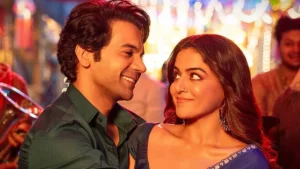
First-time director Vandana Kataria’s Noblemen throws a fascinating allegory with William Shakespeare’s play ‘The Merchant of Venice’. The integration quickly reminded me of the way Asghar Farhadi laced Arthur Miller’s ‘Death of a Salesman’ to his Academy Award-winning slow-burner Salesman. The lead protagonist Shay (Ali Haji) essays the part of Bassanio in a play for his school’s coveted Founders’ Day. However, suffocated with a sense of being perpetually wronged, the writers (Sonia Bahl, Sunil Drego, Vandana Kataria) create an arc that places him on a pedestal similar to Shylock’s, as opposed to that of the relentless lover he was elected to portray.
For starters, Noblemen is one rare Indian film that mirrors the most difficult, transitional phase in an individual’s life – the teenage. As the film rightfully points out, it is a time when your grades abruptly face a dip. You also do not know where to channel the unannounced surge in hormones. There is this constant need to prove one’s mettle – which might even include fitting oneself in hyper-masculine or ultra-feminine territories. Be it the family, educators or peers, no one quite has the formula to help the ‘troubled teens’ tackle this awkward interim chapter. In Noblemen, Kataria analyzes the psyche of a tenth-grader (Haji) who becomes an unfortunate victim of bullying in his upscale boarding school which goes by a rather oxymoronic name, Noble Valley.
While it might be a little familiar route to tread, Kataria’s leading man, Shay, is least interested in sports. He excels in theatre and literature is quite his thing. Shay is vulnerable, soft-spoken and there is a melody in his speech – making him the obvious choice to portray Bassanio in the coveted school play. The youngster values life and it is evident in the way he adopts an injured bird. Shay fondly names it ‘Phoenix’ and makes sure to name ‘him’ amongst his friends during his occasional Skype conversations with his mother (Soni Razdan). Born to parents from the Armed Forces, Shay seems to be a single child and he derives sibling-like comfort from his best friend Ganesh (Hardik Thakkar, a complete natural). The other friend that he has is Pia (Muskkaan Jaferi, expressing a range of emotions), daughter of a resident teacher and the only girl in his class. Theirs is a trio that the film doesn’t want to spell out explicitly because it knows how their marginalized individual existence is the reason for them to join forces. They can only act as a balm to each other’s wounds as they are too powerless to combat vicious abuse.
With the theme of bullying at its epicentre, Noblemen investigates why the victim seldom speaks up. If it is Ganesh’s plump body that makes him easy prey, Shay’s vague sexuality raises enough curiosity amongst the twelfth-grade thugs. While the former is dragged all over the dormitory (cleverly named ‘The Gandhi House’), the latter is frequently summoned to the perpetrators’ seedy rooms to be intimidated and abused. Before we realize, Noblemen changes contours and becomes a study of a teenager’s psychology and how he deals with conflicting emotions – all by himself.
Forming a very predictable cog in the wheel is Mr Murli played by Kunal Kapoor (pleasant as always). He is the prototypical benevolent teacher who intends to tame the hooligans and handhold the underdogs. Conveniently enough, Murli’s halo refuses to wear off in a character that offers a necessary contrast and is, therefore, easy to buy. Midway through Noblemen, there is this beautiful scene where a bare-chested Murli causes Shay’s sexual awakening. The writers balance the moment with the right volumes of a teenager’s excitement and awkwardness. Another key sequence involving the duo staged in Murli’s residence is, yet again, written and enacted with utmost sensitivity.
To delve more into the topic of sexuality, Noblemen also gifts us the rare instance where two key players discuss children’s sexual preferences in profound terms. Upon being quizzed by a concerned Murli about the existence of homosexuality in schools and junior colleges, the headmaster (M.K. Raina) retorts with angst in his eyes, “It is not addressed but is omnipresent,”. As Murli urges the need to educate the youngsters about its normalcy, the wise gentleman cites the loopholes in his idealist ambitions. As a matter of fact, Murli himself is considered queer by a section of students. Proving the social reality right, it isn’t as if the lack of knowledge is preventing youngsters from embracing their sexual orientations. What sickens them is the associated taboo – something that immediately casts you out – which is the last thing that a validation-seeking teenager would want to endure.
Another facet of Noblemen worth noticing in this respect is the key antagonist’s characterization. Arjun, played with remarkable zeal by Mohammed Ali Mir, is an extremely good-looking lad whose interactions with other guys, interestingly, is smeared with a distinctive sexual tint. We often see him lying dangerously close in the bed with his friend Baadal (Shaan Groverr) where the duo exchange cigarette puffs. Even in other key sequences where he angrily confronts Shay, the proximity that the frames maintain between them generates ambiguity. Is Arjun’s vehement homophobia a byproduct of his own masked sexuality? We are never told.
Treatment-wise, Noblemen radiates a morose mood throughout with the camera (DOP: Ramanuj Dutta) focusing exceedingly on solo frames. The backdrop is that of an all boys’ school where there is a conspicuous lack of bustle. You rarely get to see the classroom dynamics. It is always the bullies versus the victims – which becomes a little hard to stomach, especially in a passage that portrays extreme violence, albeit implied. While Kataria’s attempt to reveal the myriad faces of fear is highly successful, her backdrop does not add much to the characters’ plight. Another less exciting area is that of the villains and their broad-stroked characterization. Born to influential parents, these children are seen to run their clandestine trades of alcohol, cigarettes, marijuana and other illegal drugs in what looks like a heavily guarded school campus. The film attempts to cover up this aspect of the negligence with an alcoholic warden (Ivan Rodrigues) in place which is not a sufficient excuse to make the cut.
Noblemen chooses to end on a disturbing yet empathetic note. Kataria closes every arc that was pending and the final segment where Shay is shown to perform certain telling lines by the Bard is sure to pierce your heart. The gut-wrenching revelation that it packs along is something that will disturb you long after the show is over. It is not the most righteous of all finales but, then again, if seen through a teenager’s distressed eyes, the culmination mirrors nothing but his unstable mindscape. Anchored by Ali Haji’s powerful performance, Noblemen is no fairy tale as it comes with no conceivable solution to its central dilemma. The film exists so that we get a taste of certain under-acknowledged realities which contain the potential to make things go awry if left unchecked.
Rating: ★★★ 1/2

